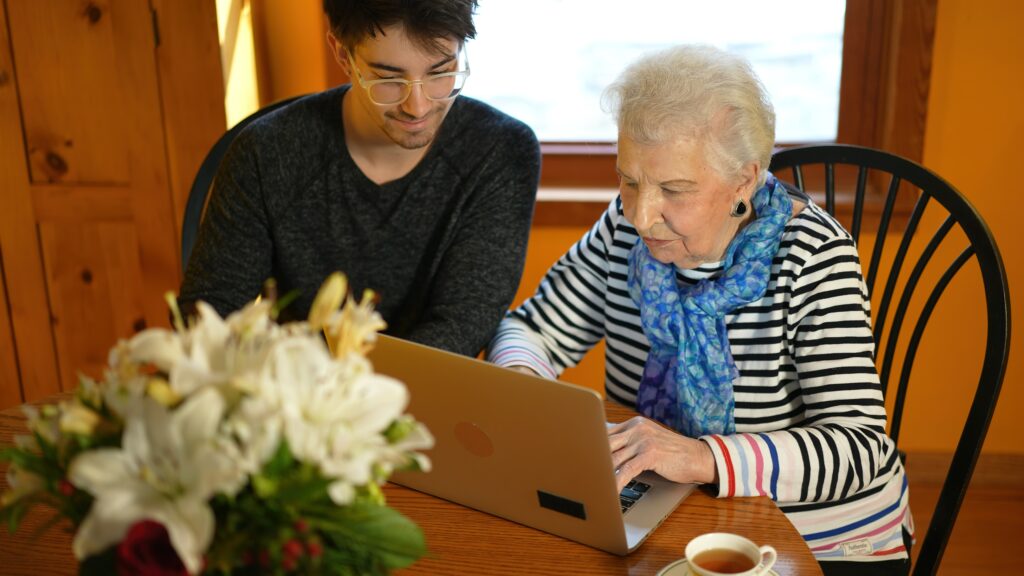Engaging them in Cybersecurity Awareness
As nurse advocates, we know how important it is to protect our aging loved ones from scammers who prey on their trust and generosity. It’s a heartbreaking reality that seniors are often targeted by these criminals, who use various tactics to trick them out of personal information or money. At Your Nurse Advocate Consulting, we’re committed to providing expert guidance and support to ensure our elderly family members stay safe and secure. In this blog post, we’ll share seven tips to protect seniors from scams.
I just turned 65 this year and already have been targeted for a Senior Scam. I have gotten 2 different calls now on my cell phone telling me they have to verify my Medicare information so they can send me a new card. The first time I toyed with them a bit to see what information they had to begin with. Name and address for sure. The gentleman was trying to be very convincing. He told me that “Medicare was getting rid of paper cards and if I had received my new plastic one. Oh, you haven’t? Let’s get that taken care for you.” He wanted my Medicare number and to verify my date of birth. Nope, not having it Mr. The second call was a young woman and not very polished and stumbled through her words. “I am calling to update your Medicare information.” This time I just said “scam” and hung up.
We recognize that, as our parents and loved ones age, they may become more susceptible to scams, including online and offline scams. It is critical to prepare ourselves and our loved ones to be vigilant against these scams. In this blog post, we aim to equip you with the knowledge and tools necessary to help protect your loved ones’ financial assets and ensure their safety.

1. Educate Seniors About Common Scams
One of the most effective ways to prevent senior scams is to educate your loved ones about common scams and their tactics. Make them aware of the kind of information scammers often ask for, such as Social Security numbers, bank account information, or passwords. Let them know about the latest scams trending online, such as phishing or click-bait ads. Encourage them to always question any suspicious calls or emails they receive.
Beware of phone scams: Scammers often use fake phone numbers and automated voice messages in their scams. It’s good practice to avoid answering phone calls from unknown numbers, especially ones that offer free or extremely reduced prices on products or services. In fact, most legitimate companies will prefer to communicate with their customers through email or text, so watch out for these common phone scams. At our Senior Care Summit we have John Kockler, owner of Adoni Networks and IT company and he is sharing a great presentation on this topic and what we can do to support our online habits as well as our aging adult family members. He shares what are good passwords, should we have more than one? How do we keep track? He has a wealth of information for us as well as tools to help prevents these scams. You can learn more and register for our Senior Care Summit HERE.
2. Spot and avoid Phishing Scams:
These scams involve scammers posing as a legitimate company, such as Amazon or Apple, and asking for personal information via a fake login page or email. The best way to avoid these scams is to never click on links in unsolicited emails. Instead, go directly to the company’s website or contact their customer service center to verify any requests. John also share’s another technique to see just where the sender is coming from.
3. Educate seniors about frauds and scams:
It’s important to educate seniors about these different types of scams, such as fake lottery scams, sweepstakes scams, and social security scams. Encourage your loved ones to seek a trusted family member or nurse advocate’s advice before making any financial decisions or providing sensitive information.

4. Put Safety Measures in Place
Another critical step in protecting senior citizens from scams is to introduce various safety measures. For instance, consider installing caller ID or call-blocking features to avoid unwanted telemarketing calls. You may also want to opt-out from mail and email lists, reducing the amount of unsolicited mail your elderly loved ones receive. Additionally, it’s essential to teach seniors to recognize and avoid unsecured websites.
Protect sensitive information: Ensure that your loved ones know not to provide social security numbers, credit card numbers, bank account information, or any other sensitive personal information to anyone. Inform them that the IRS, SSA, or law enforcement officials will never ask for personal information over the phone or email.
5. Focus on Financial Literacy
Many seniors become vulnerable to scams because they don’t understand financial matters well. To avoid such cases, it’s crucial to prioritize financial education among seniors. Enroll them in classes or workshops that teach about investment, budgeting, and managing finances. Discuss with them the importance of monitoring their financial accounts regularly and setting up alerts for any unusual charges or activity.
Keep an eye on their finances: It’s important to monitor your loved one’s financial transactions closely. Look out for any unusual withdrawals or charges. If you notice anything suspicious, contact their bank to freeze their accounts and report the fraud immediately.
Set up direct deposit: Direct deposit is a convenient and secure way to receive retirement or social security checks. It eliminates the need to visit the bank regularly, which can protect your loved one from theft or fraud.
Stay informed and updated: Keep yourself and your loved ones up-to-date on the latest scams and frauds that target seniors. Research local news and subscribe to publications such as The Elder Justice Newsletter, FDA’s Consumer Updates, or The AARP Fraud Watch Network Bulletin.
6. Stay Connected with Elderly Loved Ones
Staying connected with your elderly loved ones is an essential part of protecting them from scams. Make them feel like you’re there for them and available whenever they need your help. Establish an open line of communication, so they feel comfortable sharing any unusual activity on their accounts. Regular visits and phone calls ensure that your family member has a support system they can rely on.
Here is one thing more to consider when supporting your aging loved ones. My mom has fallen prey now 2x on scams. One for Medicare and one for “home repairs.” The first one was the home repairs. We are 5 children/siblings, and we were all upset with what she did and the money she spent. She was very upset. As an R.N. and a patient advocate, I put my professional hat on and had an open conversation with her. Please don’t berate them, ridicule them or make them feel “like a child.” They are vulnerable adults, and the circle of life is in full force. Talk to them about how to handle these calls. Never give any kind of information over the phone and explain to them if they are ever in a similar situation, please call us so we can help and get it figured out. It must be safe for them to reach out to you, or they won’t.
The second time, my mom fell prey to a Medicare phone scam. They had a phone number exchange from a large hospital system in Wisconsin and had her name, and address. The caller said they were from “_________clinic and needed to verify her information. She gave them her date of birth and Medicare number. This time she wasn’t sure she should have done that, so she called me right after she hung up with them. We contacted the FTC as well as Medicare got her on the watch list for fraud and abuse and everything was taken care of. Had she not trusted that I wouldn’t “chew her out” she may have hesitated to call for a day or two and then it could have been too late. Keep the trust and line of communications open.

7. Seek Professional Support
As a caregiver, it’s essential to seek professional support to ensure your loved ones are safe from scams. Many organizations specialize in providing the elderly with cybersecurity and scam protection services. Your Nurse Advocate Consulting offers expert guidance and support to caregivers looking to keep their elderly loved ones safe and secure.
Install security software: Cybersecurity is just as important as physical security. It’s recommended to install antivirus software on your loved one’s computer, and enable spam filters on their email accounts.
Seek professional advice: Speak to a financial advisor or an attorney to get the necessary financial and legal advice to protect your loved one’s assets and interests. During our summit presentation on Cyber Security and Senior Scams John will share resources that can assist. The summit starts on March 1, 2024 with Registration beginning this week, February 1, 2024, and you can get more information HERE.
Conclusion:
Protecting your aging loved ones from scams and financial abuse is a shared responsibility. By educating them about common scams, protecting sensitive information, and staying updated on the latest scams, we can help prevent our loved ones from falling victim to fraudsters. At Your Nurse Advocate Consulting, we are committed to providing expert guidance and support to ensure our aging loved ones receive the best possible care. Join us at our Senior Care Summit in 2024, featuring guest speaker John Kockler, the owner of Adoni Networks, who will be discussing the very topic of protecting seniors from scams and how to stay safe online. Registration begins February first, 2024. Together, we can protect vulnerable seniors from scams and financial exploitation.
Thanks for stopping by and spending a few minutes with us here on the blog. We will see you back here soon. In the meantime here are some resources for you before you leave.
Take care,
Pam and Linda
Your Nurse Advocates
“Compassionate care for aging adults, peace of mind for the adult children.”
Resources:
Cyber Security Presentation Area of Need 4 Home and Environment Senior Care Summit 2024.
https://www.nia.nih.gov/health/safety/beware-scams-targeting-older-adults
https://www.nia.nih.gov/news/scam-susceptibility-may-signal-risk-cognitive-decline





